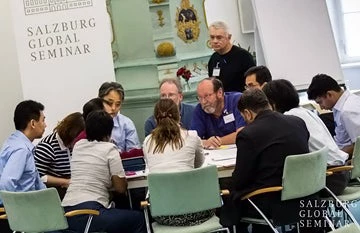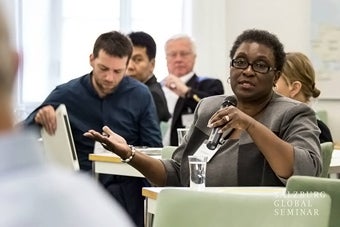
I recently returned from four days in Salzburg, participating in a seminar on “New thinking for Sustainability,” a joint initiative with the World Economic Forum's Global Agenda Council on Governance for Sustainability. The organizers did a great job bringing together a wide range of thinkers and practitioners from 26 countries. Participants ranged from a local government official in Pakistan to a former Mexican presidential candidate; from a young Thai researcher at the beginning of her career to a former secretary general of the Club of Rome looking back on decades of experience.
Opinions about the actions needed to face the challenges of the 21st century were almost equally diverse. Some participants emphasized the need for action at the local level, others stressed the crucial role of private sector, others still passionately argued that feasible solutions can only come through a strong state.
Yet a number of general principles seem to have found wide agreement (my own summary):
- There is URGENCY, on the trajectory we’re on we have few years left to avoid irreversible catastrophic damages;
- CLIMATE CHANGE is but one aspect of a comprehensive sustainability agenda but it needs to be addressed as a priority;
- we need to learn to adopt SYSTEMS THINKING and stop treating essentially connected issues as if they were distinct;
- considering the LONG TERM risks and effects of our actions has to be a guiding principle, in everything we do we should ask ourselves what will be the impact on future generations;
- we cannot wait for international bureaucratic processes but need ACTIONS now;
- and last but most importantly there is an urgent need for new thinking and new IDEAS, time for business as usual is running out.
 You might wonder what Salzburg can offer that we haven’t already seen or heard elsewhere. By itself, it is certainly only a small piece in a much larger puzzle. But let me paraphrase one participant who has spent many years immersed in international negotiations: Salzburg provides a serene space close enough to be easily accessible, yet sufficiently far away to give people pulled from one meeting to the next the opportunity to disengage and spend time building trust, put their brains together, and question set assumptions. And this is definitely something we should all try to do more often as we go through our work day.
You might wonder what Salzburg can offer that we haven’t already seen or heard elsewhere. By itself, it is certainly only a small piece in a much larger puzzle. But let me paraphrase one participant who has spent many years immersed in international negotiations: Salzburg provides a serene space close enough to be easily accessible, yet sufficiently far away to give people pulled from one meeting to the next the opportunity to disengage and spend time building trust, put their brains together, and question set assumptions. And this is definitely something we should all try to do more often as we go through our work day.
PS: My personal most interesting discovery: complementary currencies. Check out Bernard Lietaer’s work on why he believes that “our monetary system plays a critical role in causing the challenges we face, and is continually interfering with our efforts to resolve them. It is our biggest blind spot and our best leverage point for turning things around.”
Photos: Top: Jim Bacchus (standing), a former U.S. congressman, WTO appellate judge and chair of the World Economic Forum Global Agenda Council on Governance for Sustainability, listens to a session he chaired. Seated directly in front of him is Bernard Lietaer. Bottom: Liz Thompson, a former minister for energy and environment for Barbados and executive coordinator of the Rio+20 UN Conference on Sustainable Development, speaks during a session. Credit: Rob Fish/Salzburg Global Seminar.


Join the Conversation